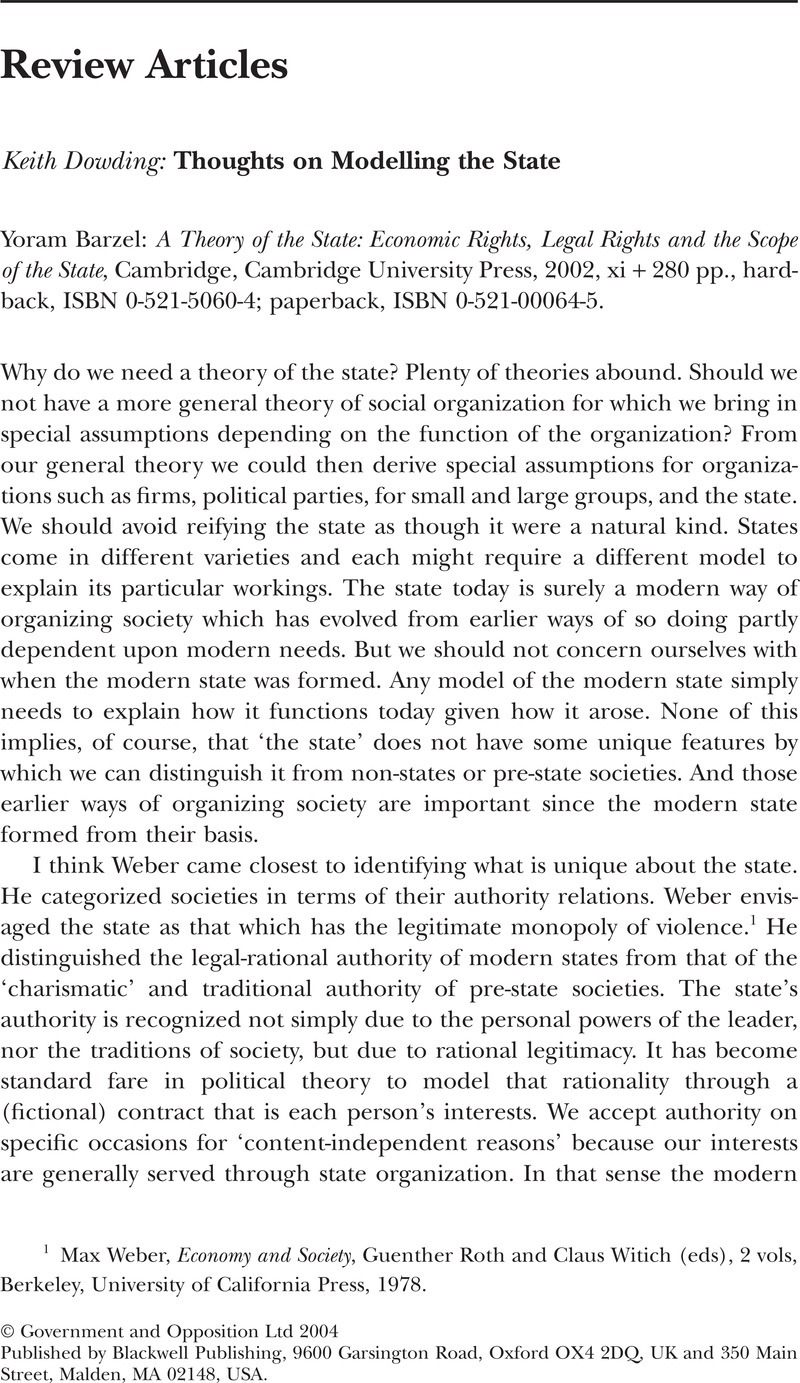No CrossRef data available.
Article contents
Thoughts on Modelling the State
Published online by Cambridge University Press: 28 March 2014
Abstract

- Type
- Review Articles
- Information
- Copyright
- Copyright © The Author(s) 2004.
References
1 Max Weber, Economy and Society, Guenther Roth and Claus Witich (eds), 2 vols, Berkeley, University of California Press, 1978.
2 Robert Ardry, The Territorial Imperative: Personal Inquiry into the Animal Origins or Property and Nations, London, Collins, 1967; M. Hauser, Wild Minds: What Animals Really Think, London, Penguin, 2001, p. 303.
3 Thomas Hobbes, Leviathan, Cambridge, Cambridge University Press, 1991 (first published 1651).
4 Michael Taylor, The Possibility of Cooperation, Cambridge, Cambridge University Press, 1987; Community, Anarchy and Liberty, Cambridge, Cambridge University Press, 1982. More generally, see the ‘folk theorem’ of Prisoners’ Dilemma-like games, consult Ken Binmore, Fun and Game: A Text on Game Theory, Lexington, Mass., D. C. Heath and Co., 1992, ch. 8.
5 Dowding, Keith, ‘Rational Choice and Trust’, Critical Review of International Social and Political Philosophy, 4: 4 (2001), pp. 207–20,CrossRefGoogle Scholar reprinted in Preston King (ed.), Trusting in Reason: Martin Hollis and the Philosophy of Social Action, London, Frank Cass, 2003, pp. 207–20.
6 Yoram Barzel, A Theory of the State: Economic Rights, Legal Rights and the Scope of the State, Cambridge, Cambridge University Press, 2002.
7 The Darwinian claim is on ibid., p. 271. The only sop to sociality and the needs of evolution is the statement on p. 14 ‘Given sexual reproduction, survival for any length of time would have been inconsistent with individuals operating completely independently. Mating and the raising of young must have occurred early.’ Yes, it must have occurred early, earlier than the history of humankind, and that is where our cooperative instincts were formed.
8 Ibid., p. 13.
9 Binmore, Ken G., ‘The Evolution of Fairness Norms’, Rationality and Society, 10 (1998), pp. 275–301.CrossRefGoogle Scholar
10 Jared Diamond's monumental history of the world is one such document, Jared Diamond, Guns, Germs and Steel: A Short History of Everybody for the Last 13,000 Years, London, Chatto and Windus, 1997. Insects, of course, have their own version of specialization. Some degree of specialization occurs in other mammals, so what defines humans is the depth and degree to which we have become specialized and the necessities of trade that that specialization entails.
11 Olson, Mancur, ‘Dictatorship, Democracy and Development’, American Political Science Review, 87 (1993), pp. 567–76;CrossRefGoogle Scholar Power and Prosperity, New York, Basic Books, 2000. Curiously, Barzel makes no use of his own work that traces some of the evolving rules legitimizing taxation and regulation, Barzel, Yoram, ‘Confiscation by the Ruler: The Rise and Fall of Jewish Lending in the Middle Ages’, Journal of Law and Economics, 25 (1991), pp. 1–14 Google Scholar; Barzel, Yoram and Kiser, Edgar, ‘Taxation and Voting Rights in Medieval England and France’, Rationality and Society, 14 (2002), pp. 473–507.CrossRefGoogle Scholar
12 See S. E. Finer, The History of Government, 3 vols, Oxford, Clarendon Press, 1997.
13 Yoram Barzel, An Economic Analysis of Property Rights, Cambridge, Cambridge University Press, 1989 (second edn 1997).
14 His formal definition appears on p. 4 (and also includes a condition of territory which I here ignore). He is explicit about the monopoly of violence on, e.g., p. 112.
15 Barzel does not explicitly refer to Weber in connection with this definition of the state, though Weber does appear in the bibliography. Another recent example of this mistake from a modern rational choice writer is Itai Sened, The Political Institution of Private Property, Cambridge, Cambridge University Press, 1997.
16 Broadly true because the boundaries of people's legitimate violence are decided by the state.
17 Of course limited liability and principal-agent problems in firms mean that firms are not the full bearers either.
18 Successful dictators often forge several coalitions simultaneously so as to play one off against another, and then turn on their colleagues without warning to ensure that no one else can create another centre of authority.
19 See Finer, History of Government, op. cit., for examples of each of these failures.
20 Barzel, A Theory of the State, op. cit., p. 61.
21 Ibid., p. 4.
22 Barzel actually says the ‘present value of the agreement must be positive through the life of the agreement’, ibid., p. 77. It is not perfectly clear what he means here. Does he mean that there must be a positive value in each round of an iterated game? Or does he mean that reciprocity can be stable with the expectation of rewards even if each round does not bring positive rewards to all parties? One way it is surely false (unless it is proved under somewhat restrictive conditions), in another we cannot gain Barzel's later interpretation of what follows from the claim.
23 We may have stable suboptimal equilibria, of course, if it is in no individual player's interest to change strategy.


